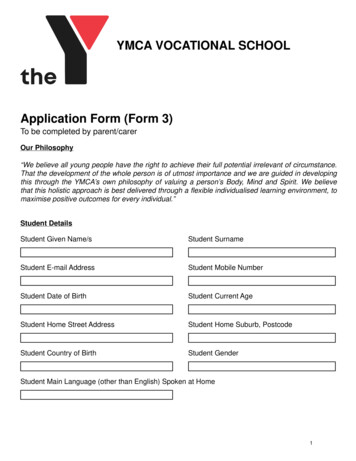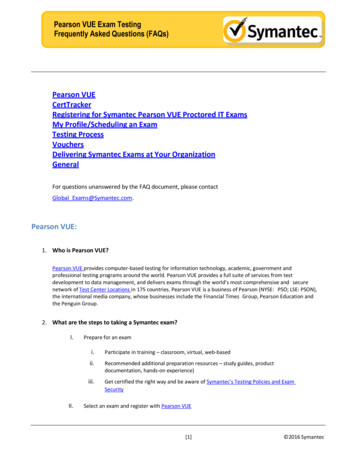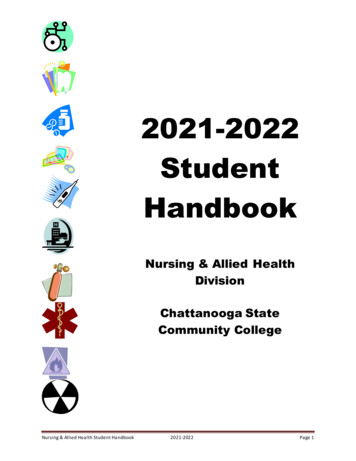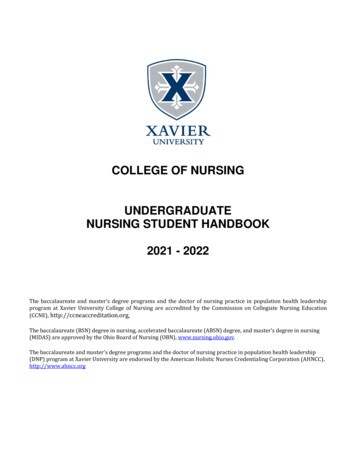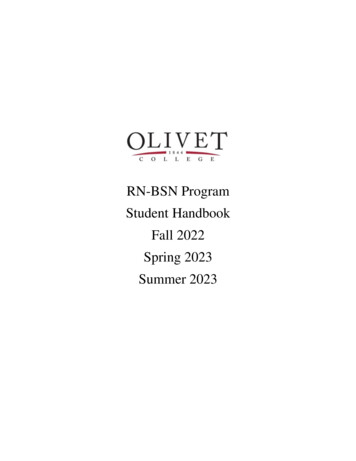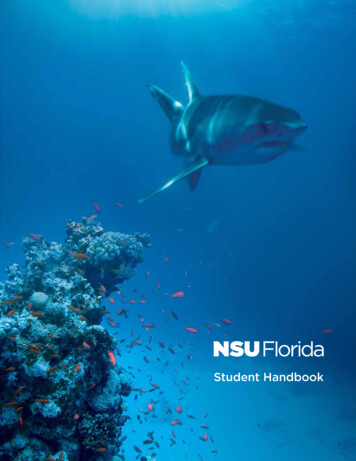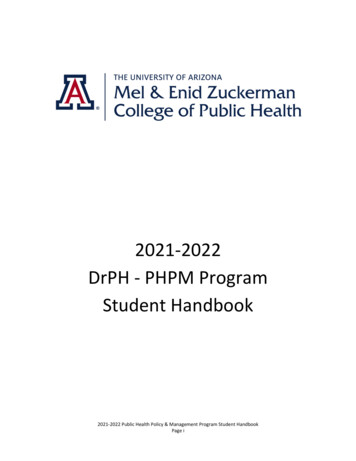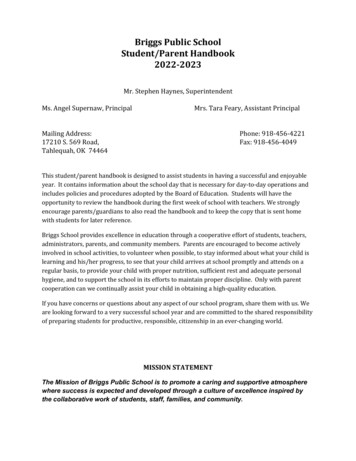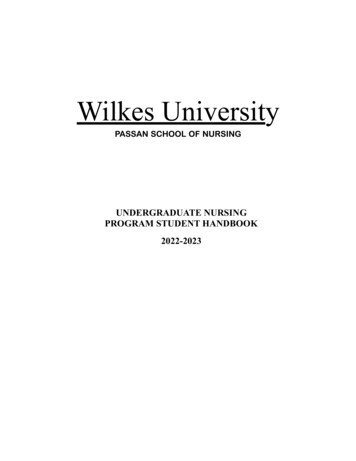
Transcription
Wilkes UniversityPASSAN SCHOOL OF NURSINGUNDERGRADUATE NURSINGPROGRAM STUDENT HANDBOOK2022-2023
Table of ContentsStudent Responsibility of Being Informed of Undergraduate Student HandbookSignature PageSocial Networking Policy and Signature PageChange in Name, Address and/or Phone Number PageThe Passan School of Nursing: Mission and VisionAccreditation for the Passan School of NursingBaccalaureate Nursing Program OutcomesBaccalaureate Nursing Student OutcomesLPN to BSN ProgramAmerican Nurses Association Code of Ethics for NursesStatement on PoliciesProfessional PolicyAcademic Honesty PolicyDisciplinary Action PolicyCommunication PolicyPolicy on Student AdvisementEntrance and Progression Policy in NursingClassroom AttendanceABSN Nursing ProgramPolicy on Written Assignment SubmissionsExamination PolicyExam Soft PolicyMedication Dosage Calculation Test PolicyAdding or Withdrawing from a CourseExpectations for Distance Education and/or Satellite CohortCourse Technology IntegrationPolicy on GrievanceTechnical Standards Essential to the Practice of NursingClinical Dress PolicyPolicy on Student ConductConfidentiality PolicyThe Medical Impact and Potential Risks for Pregnant Students in ClinicalCriteria for Physically Challenged StudentsCompletion of Required Clinical and Simulation Based Learning ExperiencesSkills and Final Exam Retesting for Returning StudentsClinical InformationPolicy for Attendance at ClinicalPolicy Regarding Absence Due to Inclement WeatherTransportation to Clinical AgencyAssumption of Risk and Release 9222324242525282830313132
Health Form PolicyHealth Screening, Clearances, Certifications, and Requirements for CastleBranchPolicy on Additional Clinical RequirementsImpaired Cognitive FunctionPolicy on Sharps, Needle Sticks, and Blood and Body Fluid Exposure and/or InjuriesStudent Sharps, Needle Stick, and Blood and Body Fluid Exposure Injury FormStudent Community Service RequirementPrecaution Guidelines for Nursing Students Caring for Clients with InfectiousDiseasesClinical Based Learning ExperiencesClinical Nursing Simulation Center (CNSC)Clinical LaboratoryPolicy on Critical Incident ReportsCritical Incident ReportMembership in Professional Nursing Organizations/University ClubStudent RepresentativesStudent EmploymentPolicy on GraduationPolicy on National Education Verification FormLicensing RequirementAppendix A - Projected Student Expenses Traditional BSN ProgramAppendix B - Projected Student Expenses Accelerated BSN ProgramAppendix C - Passan School of Nursing Clinical ContractAppendix D - Community Service Record333335I I3636383939404040414142434444444546474849
1Student Responsibility of Being Informed of Undergraduate Student Handbook SignaturePageStudents are responsible to be informed and to act in accordance with the policies, procedures,and information in the Passan School of Nursing Student Handbook, the Wilkes UniversityStudent Handbook, and the Wilkes University Bulletin. Additionally, it is a student’sresponsibility to keep informed relative to new information which is communicated to allstudents during the academic year. Any additional information will be shared through a writtenhandbook addendum form. Students will read, sign, and date this form. Signed signature andaddendum forms are placed in student files.It is the student’s responsibility to raise questions about any policy, procedure, or information intheir educational program.Your printed name and signature indicates that you have reviewed the Passan School ofNursing Undergraduate Handbook, and agree to all reported information, policies, andprocedures.Student Printed Name:Student Signature:Date signed:Student Handbook Year: 2022-2023Indicate your level/program:SophomoreJuniorSeniorAccelerated (ABSN) SummerAccelerated (ABSN) FallAccelerated (ABSN) SpringLPN to BSN
2Social Networking Policy and Signature PageOnline social media allows Wilkes University nursing students to engage in professional andpersonal conversations. The goal of this policy is to protect both Wilkes University PassanSchool of Nursing and its nursing students.According to guidelines recommended by the National Council of State Boards of Nursing(NCSBN), it is imperative to maintain confidentiality of a patient’s name and other identifiersthat could possibly identify them. Student nurses need to be aware of the potential consequencesof disclosing patient- related information via social media, and mindful of agency policies,relevant state and federal laws, and professional standards regarding patient privacy andconfidentiality.The use of electronic media must not violate patient privacy as protected under regulatory andfederal guidelines, such as the Health Insurance Portability and Accountability Act (HIPAA) of1996. The American Recovery and Reinvestment Act of 2009 (ARRA) contained the HealthInformation Technology for Economic and Clinical Health Act (HITECH) which extends theserules. If questionable material postings are made by a student(s), an investigation will follow todetermine appropriate consequences. Examples of social media platforms include, but are notlimited to Facebook, Twitter, Instagram, TikTok, Snapchat, YouTube, and LinkedIn.A student is responsible for reviewing A Nurse’s Guide to the use of Social Media and a Nurse’sGuide to Professional Boundaries by the National Council of State Boards of Nursing (NCSBN).The student’s name and signature indicates that the student has utilized the NCSBN website(www.ncsbn.org), has located and reviewed both brochures, and understands the materialcontained within them.Student Printed Name:Student Signature:Date signed:Student Handbook Year: 2022-2023SophomoreJuniorSeniorAccelerated (ABSN) SummerAccelerated (ABSN) FallAccelerated (ABSN) SpringLPN to BSN
3Change in Name, Address, and/or Phone Number PageStudents are held responsible to notify the Passan School of Nursing Administrative OfficeAssistant of any changes in their name, address and/or phone number.Previous:(Name)(Address)(Phone #)Current:(Name)(Address)(Phone #)
4The Passan School of NursingMission:The mission of the Passan School of Nursing is to develop professional nurses who will applyevidence based practice in the promotion of quality patient-centered health care to a diversepopulation.Vision:The vision of the Passan School of Nursing is to be a recognized leader in nursing education whodevelops professional nurses based upon essential concepts in the domains and competencies forentry-level professional nursing practice and advanced level nursing education.
5Accreditation for the Passan School of NursingRegional Accreditation:The Passan School of Nursing is regionally accredited by Middle States Association of Collegesand Schools. The following link provides the accreditation status for Wilkes 30/).Program Accreditation:Commission on Collegiate Nursing Education (CCNE) Accreditation StatementThe Baccalaureate of Science in Nursing degree/Master’s Degree in Nursing/Doctor of NursingPractice, and post graduate Advanced Practice Registered Nursing certificate programs at WilkesUniversity are accredited by the Commission on Collegiate Nursing Education(http://www.ccneaccreditation.org).The Graduate Nursing Program in the Passan School of Nursing builds upon The AmericanAssociation of Colleges of Nursing (AACN) (April 2021) and incorporates the followingprofessional nursing standards and guidelines, along with others identified, for meeting programoutcomes: The Essentials of Master’s Education in Nursing (AACN, 2011) The Essentials of the Doctoral Education for Advanced Nursing Practice (AACN,2006) The Criteria for Evaluation of Nurse Practitioner Programs(National Task Force in Quality Nurse Practitioner Education,2016)Baccalaureate Nursing Program OutcomesTraditional, Accelerated, and LPN to BSN Programs: Integrate knowledge from the humanities, the physical and socialsciences, nursing theory, and applied research as the foundation for theevidence based practice and education of nurses. Cultivate knowledge and leadership skills to design, manage, andcoordinate safe, high quality, and cost effective patient centered care. Translate relevant and current evidence as it relates to the researchprocess; clinical judgement; interprofessional viewpoint; and patient andfamily values as applied to practice. Use evolving information technology to assess and deliver qualityhealthcare. Provide opportunities to influence healthcare policy and practice throughadvocacy within a rapidly changing global environment. Facilitates interprofessional collaboration in the delivery of high qualityand safe patient care.
6 Develop strategies targeting health promotion and disease prevention toimprove individual and population health. Assimilate professionalism and the fundamental values of altruism,autonomy, human dignity, integrity, advocacy, and social justice to thepractice of nursing. Prepare the baccalaureate graduate nurses to provide appropriate andculturally sensitive care to individuals and populations, with variations inthe complexity of care across the lifespan and through the continuum ofhealthcare environments.Baccalaureate Nursing Student OutcomesTraditional and Accelerated Program: Synthesize theoretical, scientific, and clinical knowledge in the deliveryof safe evidence-based care through the development of critical thinking,clinical nursing judgement, and clinical competency.Apply knowledge, skills, and attitudes to design, manage, and coordinatesafe, high quality, and cost effective patient centered care.Use relevant and current evidence to guide the practice of nursing.Execute care through the application of knowledge and skills ininformation management and patient care technology.Participate in activities designed to influence healthcare policy andpractice within a dynamic environment.Collaborate as a member of interprofessional teams, with consumers andproviders of healthcare.Participate in activities designed to improve individual and populationhealth, through strategies targeting health promotion and diseaseprevention.Demonstrate professionalism in all human dimensions within nursingpractice.Provide appropriate and culturally sensitive care to individuals andpopulations, with variations in the complexity of care across the lifespanand through the continuum of healthcare environments.LPN to BSN Program:
7Licensed Practical Nurses can apply to Wilkes University for enrollment in the LPN to BSNprogram. Criteria include: Graduate from an LPN program accredited by either the NLN or ACEN A GPA of 3.0 or higher Successful completion of Anatomy & Physiology I (4 cr.), Anatomy andPhysiology II (4 cr.), Microbiology (4 cr.), and Chemistry (4 cr.), with a grade of 2.5 or higher Successful completion of English 101 (4 cr.), Psychology 101 (3 cr.), and Math094 (3 cr.), with a grade of 2.0 or higher (successful completion of Statistics (3cr.) with a grade of 2.0 or higher, can replace Math 094) A letter of recommendation from the LPN Program DirectorAfter program acceptance and a deposit is submitted to attend Wilkes University, the student willmeet with the Coordinator of the LPN to BSN program and the Student Services Coordinator inNursing.National League for Nursing (NLN) mobility examinations will determine academic placementin the curriculum and facilitate the LPN to RN transition. The Administrative Assistant inNursing will assist in arranging students to test these NLN mobility examinations. They include:1. Nutrition2. Fundamentals of Nursing3. Mental Health4. Obstetrics5. PediatricsStudents will be given two attempts to obtain the required passing score as determined by thePassan School of Nursing.American Nurses Association Code of Ethics for NursesAccording to the American Nurses Association (ANA), the nursing code of ethics is a guide for“carrying out nursing responsibilities in a manner consistent with quality in nursing care and theethical obligations of the profession.” Ethics, in general, are the moral principles that dictate howa person will conduct themselves. Ethical values are essential for ALL healthcare workers,especially nurses.Revised in 2015 to include 9 provisions, the ANA’s nursing code of ethics now includesinterpretative statements that can provide more specific guidance for nursing practice. The nineprovisions were implemented to help guide nurses in ethical decision-making throughout theirpractice.
81. The nurse practices with compassion and respect for the inherent dignity, worth, and uniqueattributes of every person.2. The nurse’s primary commitment is to the patient, whether an individual, family, group,community, or population.3. The nurse promotes, advocates for, and protects the rights, health, and safety of the patient.4. The nurse has authority, accountability, and responsibility for nursing practice; makesdecisions; and takes action consistent with the obligation to provide optimal patient care.5. The nurse owes the same duties to self as to others, including the responsibility to promotehealth and safety, preserve wholeness of character and integrity, maintain competence, andcontinue personal and professional growth.6. The nurse, through individual and collective effort, establishes, maintains, and improves theethical environment of the work setting and conditions of employment that are conducive to safe,quality health care.7. The nurse, in all roles and settings, advances the profession through research and scholarlyinquiry, professional standards development, and the generation of both nursing and healthpolicy.8. The nurse collaborates with other health professionals and the public to protect human rights,promote health diplomacy, and reduce health disparities.9. The profession of nursing, collectively through its professional organization, must articulatenursing values, maintain the integrity of the profession, and integrate principles of social justiceinto nursing and health policy.Statement on PoliciesThe undergraduate faculty in the Passan School of Nursing (PSON) reserve the right to revise therequirements and policies, as deemed as necessary at any time, to prepare students for new andemerging roles in nursing.Professional PolicyAs consistent with expectations of the practice of professional nursing, proper behavior andattitudes are expected for students enrolled in all nursing courses. Those who do not comply withthis professionalism policy will result in disciplinary actions at the discretion of the Courseand/or Clinical Instructor, Chair, and Dean. Students will receive one warning during thesemester. There will be a 1.0 point deduction from a student’s final course grade, with eachsubsequent violation of this policy, which may result in the student’s inability to successfullycomplete the course and progress in the program.Professionalism is demonstrated by a student who: Follows the American Nurses Association (ANA) Code for NursesFollows the National Council of State Boards of Nursing (NCSBN) Guidelines toProfessional Boundaries (www.ncsbn.org)Follows the NCSBN Guidelines to the Use of Social Media(www.ncsbn.org)Uses appropriate verbal and non-verbal communication
9 Is punctual for class and clinical practiceIs reliable, dependable, and accountable for one’s actionsProduces quality work in a timely mannerAccepts constructive criticism and modifies one’s behavior as necessaryIs cooperative (e.g., non-argumentative; willing and helpful)Is non-judgmental (student demonstrates an attitude of open-mindedness towards others andsituations; does not “stereotype” others or prejudge situations)Communicates assertively with honesty and integrity (actively and appropriately engages indialogue or discussion)Is self-directed in undertaking tasks, and is self-motivatedIs respectful (demonstrates regard for self, patients, peers, faculty, staff, and universityproperty)Is empathetic (demonstrates appreciation of others’ positions; attempts to identify withothers’ perspectives; demonstrates consideration towards others)Handles stress (remains calm, levelheaded, and composed in critical, stressful or difficultsituations)Is an active learner (seeks knowledge; asks questions, searches for information; takesresponsibility for own learning)Is confident (acts and communicates in a self-assured manner, yet with modesty andhumility)Follows through with responsibilities (in the event of being assigned to a task that calls forskills not possessed, the student’s responsibility is to seek out the assistance of the instructor).Is diplomatic (is fair and tactful in all dealings with patients, peers, faculty and staff)Demonstrates a desire to exceed expectations (goes above and beyond, attempts to exceedminimal standards and requirements for tasks, assignments, and responsibilities)Utilizes time efficiently (allocates and utilizes appropriate amounts of time to fulfillresponsibilities; utilizes others’ time wisely; awake and alert in class and clinical)Lack of respect for other students, professors or staff as demonstrated by comments, tone ofvoice, or disruptive behavior will not be tolerated. Everyone has a right to be heard and shouldbe able to express his/her constructive comments, without ridicule or interruption.Academic Honesty PolicyAt Wilkes the faculty and the entire University community share a deep commitment toacademic honesty and integrity. The following are considered to be serious violations and willnot be tolerated.1. Plagiarism: The use of another’s ideas, programs, or words without properacknowledgement.2. Collusion: Improper collaboration with another in preparing assignments, computerprograms, or when taking quizzes and examinations.
103. Cheating: Giving improper aid to another, or receiving such aid from another, or fromsome other source.Any student who violates the Academic Honesty Policy will be subject to sanctions inaccordance with the Wilkes University Policy.Disciplinary Action PolicyAny nursing student who violates a Wilkes University and/or PSON policy or procedure will bereferred to the Undergraduate Dean and Chair of Nursing for disciplinary action. This may resultin suspension or expulsion from Wilkes University and/or the PSON.Communication Policy To maintain confidentiality and privacy all electronic correspondences will be sent to studentWilkes University email and/or LIVE account. No other email account will be used. Studentsare responsible for obtaining all electronic correspondences sent via the University account. Cell phones and other communication devices are to be on silent mode during class. Cellphones are not to be used during class, in clinical, or in the Clinical Nursing SimulationCenter (CNSC) without expressed permission from the designated faculty member. Studentswill receive a warning the first time, then a 1.0 point deduction from the final course gradewith each subsequent disregard of this policy.Policy on Student AdvisementTraditional and LPN to BSN Program – It is the responsibility of nursing students to keeptheir advisor informed of any incident that may change their plan of learning. Faculty are available during posted office hours.Students are responsible for making an appointment with their advisor.Messages may be left for the advisor by email or a phone message.Advisement is for the purpose of assisting students in their education plan.It is the responsibility of the student to discuss all deficiency notices with their advisor.Personal and/or emotional problems will be referred to a University counselor.It is the student’s responsibility to ensure that all degree and major requirements have beenmet.ABSN Program – It is the responsibility of nursing students to keep their advisor informed ofany incident that may change their plan of learning.
11The ASBN Program Coordinator will serve as the nursing student advisor. Students will becontacted by the coordinator by email during the first week of class, for introduction and toprovide contact information. Students are responsible for contacting their advisor with any issuesencountered. The advisor is responsible for timely responses to the student and for providingguidance with meeting program requirements. The student and advisor collaborate ongoing anddevelop a plan to meet the student’s individual learning needs.Entrance and Progression Policy in NursingIn order to ENTER the Traditional Bachelor of Science Nursing Program students must: Achieve a score of 18 or higher on the University Math Placement Exam within twoattempts, or achieve a 2.0 or higher in MTH 094 prior to taking pre-requisite science courses(See Math Competency Policy). Earn a 2.0 or higher in English 101 Earn a 2.5 or higher in all prerequisite science courses (Anatomy & Physiology I (4 cr.),Anatomy & Physiology II (4 cr.), Microbiology (4 cr.), and Chemistry (4 cr.). A student willbe allowed only one repeat of a science course. A student who achieves less than a 2.5 in twoscience courses or less than a 2.5 in the repeat of the same science course will not be able toprogress into the nursing program. PAX will be waived for transfer students, LPN applicants, and those seeking a change ofmajor to nursing, having completed two science courses and meeting required GPA formajor. Achieve a cumulative Grade Point Average (GPA) of 2.5 or higher prior to entry into theundergraduate nursing program.In order to ENTER the Accelerated Bachelor of Science Nursing (ABSN) Program studentsmust: Check with the ABSN Coordinator about this aspect of screening/admission into theprogram.In order to progress THROUGH the nursing program, all nursing students must: Earn a 2.5 or higher in all nursing courses A nursing student who earns less than a 2.5 in a nursing course is unsuccessful in that course.Students are allowed only one repeat of one nursing course in order to progress in theprogram.
12 Students are required to maintain a cumulative Grade Point Average (GPA) of 2.5 or higher. Students who do not achieve the minimum cumulative GPA of 2.5 or higher will be placedon probation for the next semester to increase their GPA. Failure to achieve a cumulativeGPA of 2.5 or higher after the probationary semester will result in program dismissal.Students will be provided only one semester for probation throughout the nursing program. Students must achieve a 2.5 or higher in all science courses (Anatomy & Physiology I (4 cr.)Anatomy & Physiology II (4 cr.), Microbiology (4 cr.), Chemistry (4 cr.) and EnvironmentalScience (3 cr.). A student who achieves less than a 2.5 in two science courses or less thana 2.5 in the repeat of the same science course, will not be able to continue in the nursingprogram. Designated nursing courses measure outcomes using brackets. Each syllabus will providespecifics on brackets for the course. Using bracketing, your final course grade is determined as follows: If the average within each bracket is greater than or equal to 79%, the final grade willbe the averages weighted according to the bracket value. If the average of one or more bracket is less than 79%, the final grade will be thegrade for the lowest bracket.Classroom AttendanceAttendance is required for in person classes, including scheduled Interprofessional Education(IPE) events. Attendance will be taken at the beginning of each class day. In the case of anunusual circumstance (e.g., major illness, death in the family), the student must contact by emailor phone, the classroom instructor no later than one-half hour prior to the beginning of the class.A student will receive a warning on the first lateness or unexcused absence, then a 1.0 pointdeduction from the final grade with each subsequent disregard of this policy. An excuse from ahealth care provider may be requested or required.For online classes, participation in all activities is required. Attendance will be taken in remoteclass sessions. Students must complete discussion boards and other online activities by specifieddue dates. Points will be deducted for late completion using the associated assignment gradingrubric.Students are to not schedule travel or vacation at any time during the course of the academicsemester when classes or clinical are in session. Emergency situations will be discussed with thecourse instructor and Undergraduate Chair.
13ABSN Nursing ProgramStudents are expected to participate in online or satellite classes from the first day of each course,which includes students in clinical courses starting clinical hours at approved clinical sites. Eachcourse assignment including discussion posts contributes towards meeting student learning andcourse outcomes. Students who do not participate weekly, as per each course expectation, issubject to failing the course. A student unable to meet course requirements for a distanceeducation course is expected to notify the instructor as soon as the student is aware of thepotential conflict. Faculty are not obligated to give credit or make concessions for student missedtime. Assignments/discussions turned in late without previous approval will receive a five pointdeduction for every day late. The student’s grade will reflect incomplete work for the week.Students may ultimately be removed from the course for non-participation as per the terms of thecourse. Failure of students to post the required responses to the discussion question(s) in weekone prior to 11:59 pm EST of the first Sunday demonstrate lack of participation, which mayresult in being administratively dropped from the course. Students in courses with clinical hoursare required to complete clinical hours and assignments as per the syllabus. Clinical hours shouldbe completed weekly and at a minimum of 50% by the mid semester point. Application ofclassroom didactic theory in the clinical setting is the expectation with learning. Failure to meetthe time frames of the course will result in failing grades for the appropriate assignments.Policy on Written Assignment SubmissionsThe student is expected to maintain Academic Honesty and adhere to the IntellectualResponsibility and Plagiarism Policy as stated in the University Student Handbookand as stated under Academic Honesty in this Nursing Student Handbook. Thefollowing submission and grading criteria shall apply to all students when submittingpapers for nursing courses:1. Completed papers shall be submitted to the course instructor via Assignment dropbox in LIVE in Microsoft Word format at the time and date specified by theinstructor.2. Five (5) points per day, including weekends, will be deducted from the finalgrade of the assignment that is not submitted by the scheduled due date and time.Eastern Standard Time (EST) will apply.3. Graded assignments will be returned to students between two to three weeksfrom the assignment due date.4. Turnitin originality check will be applied to all written nursing paperassignments. The required percentage will follow the Turnitin Policy posted ineach course.Examination PolicyAll students are expected to arrive at in person exams or begin remote exams on time. In theunusual or unexpected circumstance in which a student cannot take an exam at the scheduled
14time, the student must contact the classroom instructor no later than one hour prior to thestart of the exam for that day. An exam will be administered within 48 hours after thescheduled date and time. Any suspected incident of student cheating will be handled inaccordance with University Policy.Notification of absence requires the following steps:1.Contact course instructor.2.If ill, a health care provider’s excuse may be required by the instructor upon return toclass.3.The makeup examination will be prescheduled with the instructor and taken within 48hours from the original examination, or the student will receive a zero on thatexamination.Students will:1.Not have access to course material.2.Speak directly to a proctor when requesting clarification of words or statements.3.Not leave the room without permission of a proctor during the examination.4.Leave the room and move away quietly upon completion of examination.5.Not be given extra time to take the examination if they arrive late.6.Not be allowed to use a cell phone or handheld calculator during an examination.Every unit examination in all clinical and non-clinical courses will include two (2) medicationdosage calculation questions and five (5) on final exams.Bracketing Designated nursing courses measure outcomes using brackets. Each syllabus will providespecifics on brackets for the course. Using bracketing, your final course grade is determined as follows: If the average within each bracket is greater than or equal to 79%, the final grade willbe the averages weighted according to the bracket value. If the average of one or more bracket is less than 79%, the final grade will be thegrade for the lowest bracket.Traditional BSN program non-clinical nursing course bracketing example:Bracket OneBracket Two(80 points – 15%)Bracket Three(150 points – 10%)
15(250 points –75%)Exam One - 50pointsExam Two - 50pointsExam Three - 50pointsFinal Exam 100 pointsParticipationpointsQuizzespoints- 30Annotated bibliography – 50 pointsWritten paper – 100 points- 50Total points for course: 480Traditional BSN program clinical nursing course bracketing example:Bracket One(250 points –75%)Exam One - 50pointsExam Two - 50pointsExam Three - 50pointsFinal Exam - 100pointsBracket Two(180 points – 15%)Bracket Three(89 points – 10%)Written Paper - 100pointsParticipation/Attendance- 30 pointsQuizzes - 50 pointsCCEI – 22 pointsClinical evaluation – 50 pointsSkills Checks - 12 pointsCommunity Service – 5 pointsTotal points for course: 519ABSN program non-clinical nursing course bracketing example:Bracket OneBracket TwoBracket Three
16(250 point
Baccalaureate Nursing Program Outcomes 5 . The vision of the Passan School of Nursing is to be a recognized leader in nursing education who develops professional nurses based upon essential concepts in the domains and competencies for . The Essentials of Master 's Education in Nursing (AACN, 2011) The Essentials of the Doctoral Education .


